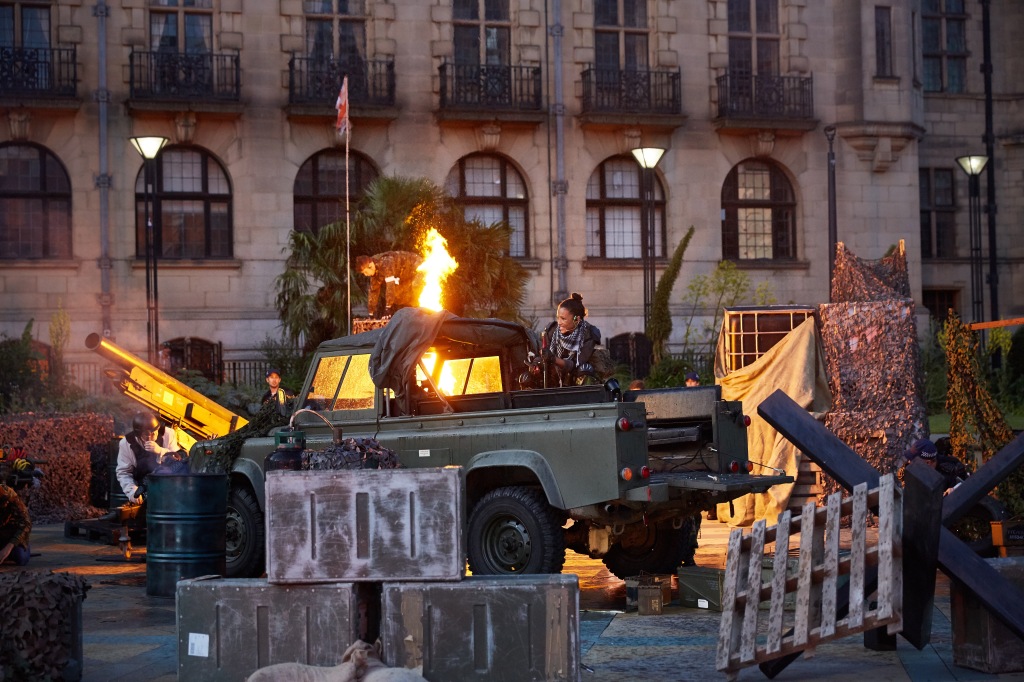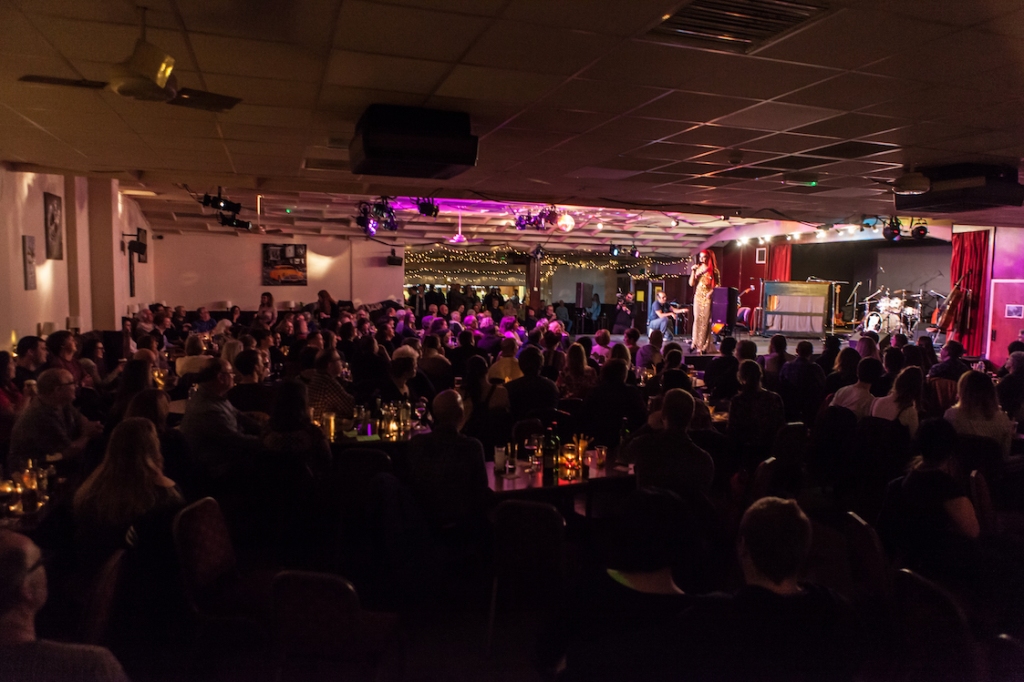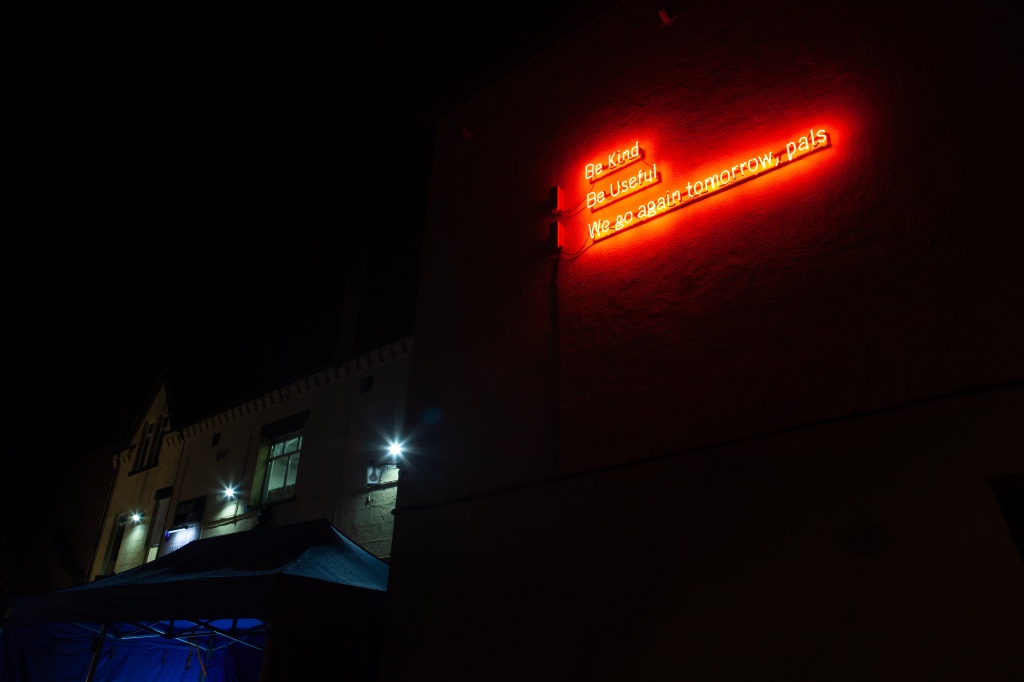We sold the old Army landrover that has appeared in countless Slung Low adventures and shows the other day. She was called Bear. And she was ridiculous to drive, had absolutely no fuel efficiency but she made you feel like a hero when you were bouncing around with the top down entering the square in front of The Crucible, or chasing the sun in the Peak District on The Magician shoot.
Davidbaby was furious. I explained that we had other adventures coming, new commitments to the children of Ingram Road primary school, TWO new theatres, a new floor needed and the money from the sale would help achieve those things.
That made him more furious. “If you earned more money,” he shouted, “you wouldn’t need to sell Bear.” And then he did this incredibly flamboyant flop to the floor, like a six year old Peter O’Toole. Which is when I love him the most quite frankly.

Every arts organisations who applied for regular funding from the Arts Council, England just received an email advising them what to do if successful, and what to do if they were not. In the Arts we’re about to head, one way or another, in to a period of loss. The decisions by Arts Council, England this October will bring in a wave of new and different organisations, or it will consolidate the existing ones.
Maybe ten years ago there was an argument that both roads could be taken simultaneously but the only people now who genuinely think you can grow a pie, and then turn that pie into a cake, have the cake and eat it are the leaders of the Conservative party: and they’ve just crashed sterling and set fire to the bond markets- choices are going to have to be made. In one way or another there are some endings coming.
I once heard an Artistic Director of a theatre (was it Lorne Campbell, I think it was Lorne) say that part of the issue with subsidised theatres was that they were never allowed to lay down any of their responsibilities.
These organisations had taken on so many more priorities and responsibilities since they were born without ever having permission to examine the core of their business- their charitable aims staying pretty much static for fifty years, their business models marooned in understandings of society from yesterday. Well we’re going to need to lay down some responsibilities if we’re to survive in a mostly static funding settlement and a cost of living crisis. We will be known by what we choose to lay down. Endings are coming, but which ones?
We’ve going through a big ending here at Slung Low. For four years we’ve managed the oldest working men’s club in Britain, The Holbeck. For four years it’s been a pay what you decide arts and community venue- a theatre, a pub, a polling station, hosting councillor surgeries, a food bank, a wedding venue, home to a football team and football fans, a church, a rehearsal room- serving and hosting it’s communities in ways that it had never before in its 150 year history.
In the four years we’ve managed the place we’ve paid off it’s substantial historic debt, professionalised the bar, turned a profit with a new business model and refurbished the inside and outside in order to make the place safe and crucially physically accessible to all. We invested hundreds of thousands of pounds and all the energy we could muster.
I thought I would spend my forties being part of the team running this place.
I was wrong.

The reasons why we are leaving are complicated (and also the subject of a new book and I need to leave something to write in it ;-). But broadly speaking we found it… I found it… impossible to convince the elected committee of the club to agree with some our basic principles of how the club should be run. We disagreed about who should be welcome, and how they should be welcome, into the club. We disagreed about when we say “we serve our community” what the word serve meant and who we thought our community is. And we disagreed about how much money should be spent subsidising the beer of a small group of people sat in a pub that too many other people found unfriendly and sometimes openly hostile.
Alongside these disagreements was our absolute belief that the club must remain as a members owned organisation. If this is what the elected committee wanted then it must be so. It isn’t an easy chapter ending they’ve chosen, but they have chosen it. It is theirs, they must own it now.
And Slung Low must choose their endings, just the same as everyone else.

Our commitment to Holbeck was absolute, but not to The Holbeck. And the building was as much a burden as it was a tool for usefulness. The Arts Council turned down a second capital application that some had encouraged and revealed that we were not actually eligible for capital funding.
Choices and consequences.
We made our choice.
At this year’s AGM we asked the members to vote us out of the club and, after one of the more stressful meetings of my life, they did.
We found two new homes in Holbeck- you can read about them here. Expanding our capability and capacity. Allowing us to better meet some of our responsibilities and, crucially, lay some other responsibilities down.
Recently there was a new Chief of Defence Staff, Admiral Sir Tony Radakin. He used to be the head of the Royal Navy and in one of his first interviews he was asked what he had learnt from running the navy that he would take in to his new job of CDS.
He said that there was a tendency to think that change was inherently risky. That in the risk register people would instinctively put an additional point of risk on a new action, simply because it was new. When in actual fact sometimes to stand still, to continue to do the same thing, was much riskier.
In the weeks after we announced we were leaving the club and moving, thanks to new relationships with private partners, to two new venues that have neither asbestos nor racism, the Arts Council added another line to our risk register.
Sometimes to stand still is more risky than to move. In fact, in my experience, inaction is too often confused with being resolute. And it isn’t the same thing at all.
I don’t regret a minute of the time at the club. But I was for a long time frustrated by the idea of leaving behind all this effort, all this capital, sweat and treasure: caught up in a narrative that the failure to convince the committee of a future made pointless the success of the past.
The other night the club committee organised a Freddie Mercury impersonator upstairs at the club that the team and Davidbaby went along to. As it started two young lads in big wheelchairs came up the lift and took front row seats- clapping along to Don’t Stop Me Now and Bohemian Rhapsody.
They would never have got up the stairs before. And were clearly having the time of their lives.
The lift is in constant use by people who were previously locked out but if these two young lads were the only people who used the lift how much money would be too much for that moment of joy. That’s what I sat there thinking as I thought about all the time, money and effort we would be leaving behind because I had failed to convince some people of an argument about a changing world. And do you know what? I’d pay every penny. Every penny. Every hour of graft. Every one of them.
What price a moment of joy?
Just because it’s ending doesn’t mean it wasn’t worth it. As theatre makers you’d think we’d naturally understand that. But we don’t, not at an organisational level.
Change is coming. Not just in Arts Council funding. Crisis is here, it’s in every news headline, and change rides pillion with crisis.
We must be careful not to be conservative. Careful not to fear change for change’s sake but rather to fight for the type of change we need. That’s the battle, not to protect what we have, but to imagine a better future and then insist on it.
Too often in the arts we assess risk so that change becomes almost impossible: a quieter life to stand still. Even when we know our now doesn’t work for enough of our communities. Even when we know our reality is not good enough, that we must do better. Out of fear we will cling to the devil we know.
But it’s still a devil.
And even worse we convince ourselves that the change would not be necessary if only we were better. Efficiencies will save the day. Income generation. Philanthropy. I’ve lived through enough silver bullets that turned out to be blanks to know that none of them are a substitute for imagining a better future and then insisting on the change to conjure it in to being.
We fool ourselves that if only we were more successful we wouldn’t need to make these decisions.
That is the argument of a six year old. A magnificently dramatic six year old. Don’t be fooled by it. Endings are coming. We have to choose the right ones, it’s how we will ensure the best beginnings follow on. We will be known by what we have done and what we are willing to give up.
